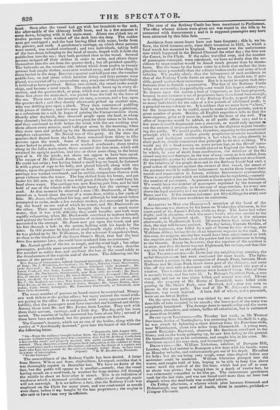Accidents from steam-boats have not been frequent ; this is,
we be. lieve, the third instance only, since their invention in 1812, in which a fatal wreck has occurred in England. The second was the unfortunate case which happened in the Bristol Channel the other day ; the first was the Comet, in the Clyde. If the miles travelled over, and the number
of passengers conveyed, were calculated, we have no doubt that the ac- cidents by stage-coaches would be found much greater than by steam-
boats. But the losses by the latter come in a form that strikes the ima- gination more powerfully than the solitary broken necks and arms of laud vehicles. We readily admit, that the infrequency of such accidents as that of the Rothsay Castle forms no reason why we should not, if pos- sible, guard against their recurrence. But it is easier to regret such mis- fortunes than to furnish a preventive. The fact of the Rothsay Castle being not sea-worthy, is a peculiarity—we would fain hope:a solitary one. To impose upon the nation a host of inspectors, as has been proposed, because in one instance a set of proprietors have been found base enough,- as is alleged of the proprietors of the Rothsay Castle, to peril the life of so many individuals for the sake of a few pounds of additional profit, is a proposal we must demur to. It is evident that we must have "a host," for the inspection, to be useful, must be made at short periods, and at a great number of ports. Besides, all English experience tells us that the mere expense, great as it must be, would be the least of the evil. The office of inspector would be jobbed, as all public offices are ; and in a few years it would degenerate into a sinecure, or would only operate Wi vex the owners of steam-packets, without its the slightest degree benefit ins; the public. We would prefer, therefore, opposing to the commercial principle which would induce greedy proprietors to retain insufficient vessels and inefficient commanders, a law which, by going directly to their pockets, should counteract that principle by its own working. We would not fix a head-money on every person lost, as time Herald some- what drolly proposes' but we would extend to England the Scotch law, by which, in case of death from carelessness, the relatives of the de. ceased may recover damages, in the way of assvt:inient, as it is called, from the responsible parties by ;hose carelessness the accident was occasioned. If the relatives of the people drowned in the Rothsay Castle had each a good action of damages against the owners of that vessel, the smart of the payment would lie sufficient inducement to make them inspect their vessels and commanders in future, without Government overseership. There is another point which we think might also lie regulated,—namely the number of passengers. At present a steam-packet has no limitation. We would have the number of passengers regulated by the tonnage of the vessel, with a penalty, as in the case of stage-coaches, for every one above the legal number ; and we would leave the exaction of it to Messrs. Byers and Co. If the common informer got fifty shillings for every case of delinquency, the cases would not be numerous.


























 Previous page
Previous page